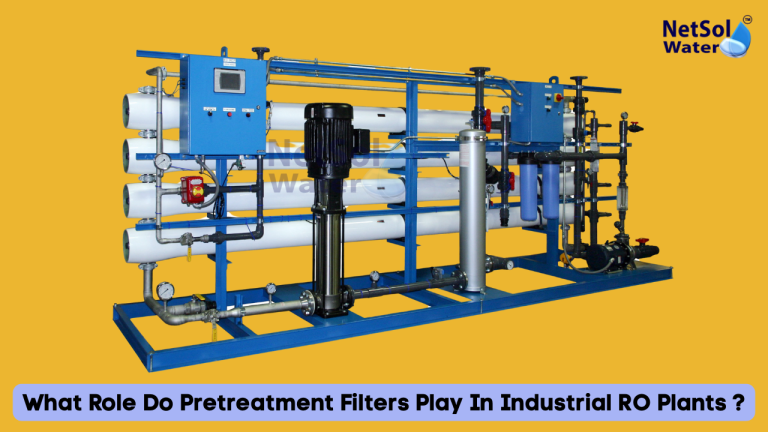
Pretreatment filters are the key to prolonging the effectiveness and life of industrial RO plants. Pretreatment filters are the first defense against water treatment, and they trap contaminants before the interaction between the water and the RO membranes. The role of pretreatment filters in industrial RO plants is important as it prevents fouling and scaling of the RO membranes, thereby enhancing the efficiency and life of the system. In this blog, we read about What Role Do Pretreatment Filters Play In Industrial RO Plants, their process, and how they are important to water treatment efficiency. The Importance of Pretreatment Filters
The Importance of Pretreatment Filters
The water, before treatment in the reverse osmosis system, has a number of impurities in the form of suspended solids, organic matter, chlorine, and minerals like calcium and magnesium. These impurities will lead to severe damage to the RO membranes by inefficiency, extra maintenance effort, and replacement of the membranes from time to time.
The primary role of pretreatment filters in industrial RO plants is to remove such impurities from water so that filtered water, and that just clean one, will be sent to the RO membranes. Through this way, clogging or destruction of membranes with particles and chemicals that will render the membranes useless and add operating cost are prevented.
How Do Pretreatment Filters Work in Industrial RO Plants?
Industrial RO plants typically come with pretreatment filters consisting of several stages of filtration, each of which removes a certain type of contaminant from water. The filters make sure water fed to the RO plant is as clean as possible, giving extra purification to the plant overall.
1) Sediment Filtration
The initial pretreatment process is usually sediment filtration that separates large particles such as rust, sand, and dust. Sediment filters prevent such kinds of particles from passing over to RO membranes that physically damage or slow down the water to allow it to pass.
2) Activated Carbon Filtration
Activated carbon filters eliminate other organic chemicals and chloramines and chlorine from water. Chlorine is extremely damaging to the RO membranes and causes them to deteriorate early. Activated carbon filters extend the life of the RO membranes and enhance treated water quality by removing chlorine and other organic impurities.
3) Water Softening
Water softeners activate a process which removes calcium and magnesium that create hard water deposits. Hard water scaling forms crystals which reduce RO membrane performance and reduce their operational life. Water softening methods keep scaling from accumulating to maintain normal RO plant performance levels.
4) Antiscalant Injection
The treatment of water through chemical antiscalant addition protects membranes from scaling formation. The chemicals chelate metals to create protective agents that stops solid deposits from forming on the RO membranes while keeping the system from damaging.
Why Are Pretreatment Filters Important for Industrial RO Plants
Pre-treatment filters are an important element in the efficient operation of industrial RO plants. This is the very reason they are so significant:
1) RO Membrane Protection
The replacement costs of RO membranes remain high while their operational lifetime becomes significantly reduced by exposure to chlorine and suspended solids and hardness minerals. Pretreatment filters along with their primary focus operate inside industrial RO plants to block contaminants from entering membrane areas where they would destroy membranes resulting in permanent replacements.
2) Better Efficiency
Pretreatment removes contaminants from water allows RO membranes to operate more effectively through clean water flow. Pretreatment filters ensure clean water by delivering efficient filtration and accelerating flow while producing treated water of excellent quality.
3) Lower Maintenance Cost
Maintenance and periodic cleaning of RO plants are essential for peak performance. In the absence of pretreatment, however, RO membranes can clog or even get damaged, with additional maintenance and higher operating costs. Pretreatment filters, by removing impurities effectively at the first stage, minimize the necessity of expensive maintenance and increase the life of the overall system.
4) Improved Quality of Water
Pretreatment filters help wash out the toxic impurities from the water, which increases treated water quality. Clean water use not only maintains the efficiency of industrial processes but also keeps the water in shape for use in applications like pharmaceutical, food processing, and power generation.
Conclusion
The role of pretreatment filters in industrial RO plants cannot be overrated. Pretreatment systems serve to protect RO membranes from damage and simultaneously increase system efficiency and cost-effectiveness while producing high-quality treated water. The proper pretreatment of feedwater enables industrial RO plants to reach peak capacity while reducing operational interruptions thus securing financial productivity and operational sustainability. Industrial RO plants operated at their highest potential depend on correct pretreatment filter choices combined with scheduled maintenance to support long-term financial success for water-purification-based industries.
Do you need an advice or assistance on selecting the best water and waste water treatment unit? We have solutions for all your problems!
Let us know your problem, our experts will make sure that it goes away.
For an assistance or related query,
Call on +91-9650608473
Or write us at enquiry@netsolwater.com
